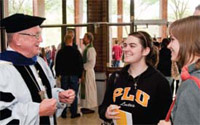Page 268 • (2,856 results in 0.032 seconds)
-
they learn in their classes, and financially supporting those that wish to attend the state conference for music educators. CWMEA is a subset of and liaison to the Washington Music Educators Association (WMEA) and the National Association for Music Education (NAfME), which in turn provides professional development and connection opportunities for all members. These opportunities take the form of social events, workshops, panels, and much more. Type of Club or Organization: Academic Clubs & Honor
-
account using the e-pass computer account and email address online form. This will create your PLU email address. Your student ID is on the top of your admit letter. 3. Sign and submit your Financial Aid Award Notice and complete the Online Payment Contract. 4. Email your advisor. Your advisor’s name and email address are on your admission letter. Introduce yourself and ask what classes you should take and what time the orientation is for your graduate program. 5. Plan to attend the New International
-
of extraction and exploitation of diverse energy resources in a global context. Includes labs. (4) ESCI 201 : Geologic Principles - NW This course prepares students for upper-division classes in earth science by investigating earth materials and tectonic processes across spatial scales from the microscopic to the planetary and through geologic time. Emphasis is placed on learning how to form and answer geologically appropriate questions. Includes labs and field trips outside of class time. This
-
Provost makes available a number of small grants for the purpose of stimulating teaching and learning. Criteria: These grants are intended to aid the faculty member whose spur-of-the-moment idea or out-of-the-ordinary method promises improved instruction for a specific class or series of classes. Proposals are considered when funds are not otherwise available from departmental, school, or college sources. Furthermore, funds from this source are not for the purpose of providing normal operating
-
classes in a given term. Instructors will receive an email 48 hours in advance of this launch, allowing them the option of discussing the process with students and notifying students that class time will be provided for completing the feedback form. As noted in the Faculty Handbook (Part VII. Other Policies, Section 3. Instructional Responsibilities and Course Procedures, G.1.a), “where possible, the teaching and course feedback form will be completed in class, with adequate time allowed by the
-
account using the e-pass computer account and email address online form. This will create your PLU email address. Your student ID is on the top of your admit letter. 3. Sign and submit your Financial Aid Award Notice and complete the Online Payment Contract. 4. Email your advisor. Your advisor’s name and email address are on your admission letter. Introduce yourself and ask what classes you should take and what time the orientation is for your graduate program. 5. Plan to attend the New International
-
worked with, supervised, or taught you in service-related work or in relevant courses. Your references will receive an email invitation from gradcasinfo@liaisoncas.com with instructions for completing the reference electronically. If your recommenders need assistance, please visit the Letters by Liaison Help Center. Note: If you are a current PLU student majoring in social work (applying for advanced standing) with a 3.0 or higher GPA in social work classes OR minoring in social work (applying for
-

technology in education will continue to grow. We will never be a fully online university, and we may not, at least in the short term, offer completely online classes or programs. But I believe that we must continue to stay near the cutting edge in classroom-based technology use if we expect to compete for the next generation of the best and brightest. They will expect nothing less. Third, the world continues to get smaller. Our nationally recognized position as a leader in global education is a huge
-

with that and struggling with going back to school. Right after it happened, I actually called Gonzaga and withdrew from school because I didn’t think I wanted to go back. I had thought I was called to stay at home. Two days later, I figured out that I couldn’t use my brother as the reason why I didn’t get my bachelor’s degree. He wouldn’t want that laid on him. So, I called back and asked if I could get back into my classes. Transitioning back to school after that happened was tough, but I felt so
-

justice. I remember reading about apartheid and the Palestinian-Israeli conflict and really becoming aware of the hatred and injustice in the world. Dr. (Karen) Travis introduced me to public health and showed me a way to use my skills in a field that I was passionate about. My ways of thinking were influenced by my economics classes, I often stop and think about the incentive structures that are leading people to make certain decisions, or about the economics of prevention. I also reinforced my value
Do you have any feedback for us? If so, feel free to use our Feedback Form.


